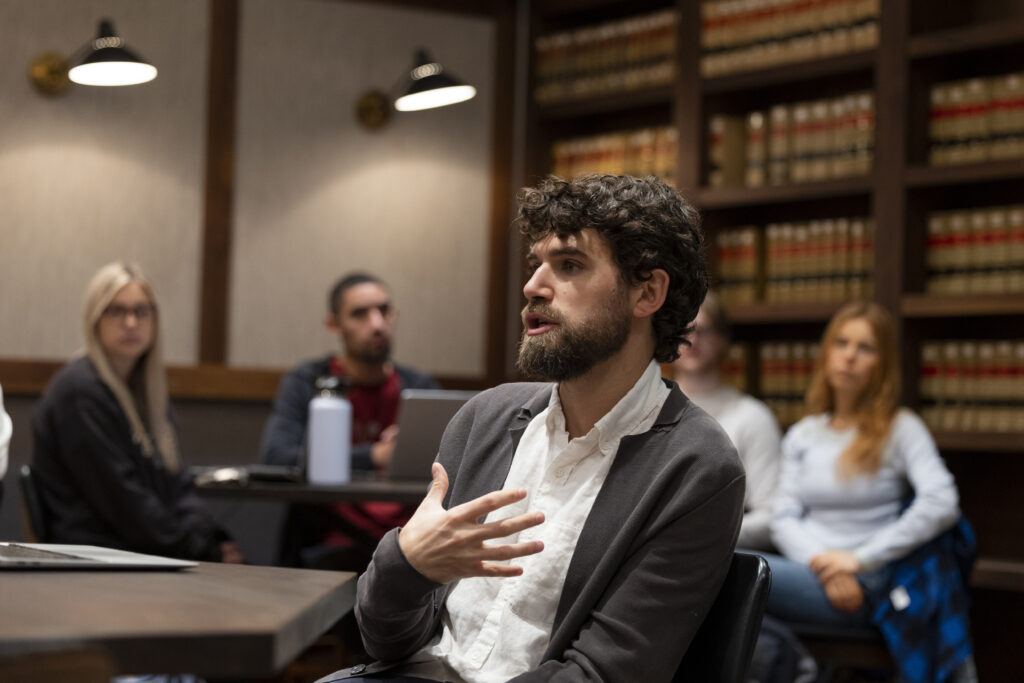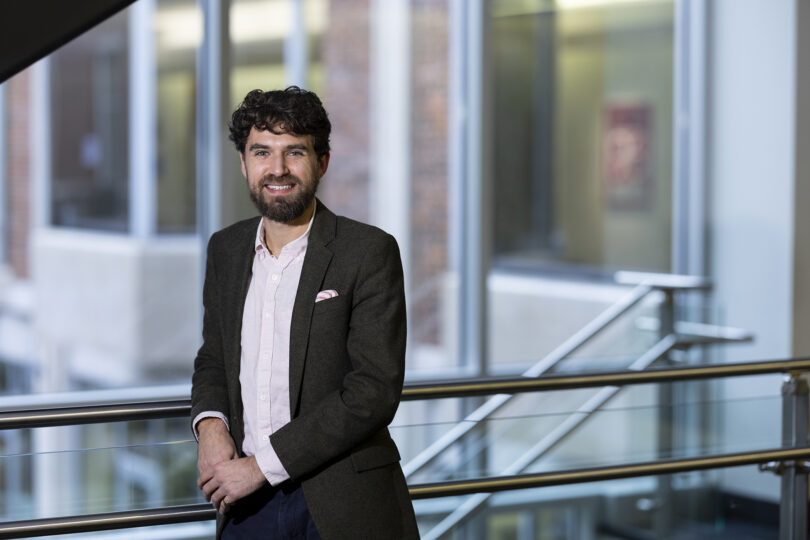Thomas Kadri’s research sits at the intersection of free speech, technology and privacy. How exactly does the law interact with technology and other regulatory forces?
“It’s often about trying to figure out what the correct balance is as a matter of constitutional law, as a matter of certain statutory law and even as a matter of policy,” said Kadri, assistant professor in the School of Law. “How do we want to strike that balance and navigate the competing interests that are at stake?”
Kadri was raised in a Lebanese-British family and grew up between the United Kingdom and France. He earned a degree in international relations from the University of St Andrews and then received a fellowship to study at Emory University for a year—an academic and cultural exchange of four students between the two universities each year. Those students study whatever field they’d like during the program.
“It led me to think about studying law in the United States,” he said. “I took a few political science, history and sociology classes at Emory that all had some connection to the legal system in the U.S., and I thought I might want to stay and pursue a law degree here.”
He did and received a J.D. from the University of Michigan. Early on in law school, Kadri found that the idea of becoming a law professor appealed to him, and he went on to earn a Ph.D. in law from Yale University.
“I’ve always liked the idea of being an educator,” he said.

Thomas Kadri leads his digital abuse class in the Cheeley Room inside Hirsch Hall. (Photo by Andrew Davis Tucker/UGA)
Kadri quickly found that a big part of being an academic leader is research. He enjoyed the work of research as well as the writing and editing involved.
“I thought, ‘Well, if those are the two main features of this job—teaching and being able to do research—it sounds like a dream job to me,’” he said. “It’s this blend of different and rewarding work: being in the classroom, trying to engage with students and mentor them, and then, on the other side, the freedom to do a lot of different types of research.”
For Kadri, his research is also personal. Just as he was entering the job market, he faced a more pressing concern—a stalker. The experience inspired him to pursue further research on how people use technology to perpetrate abuse.
“It was very reminiscent of some of the things that I was studying in my work,” he said.
Eventually, Kadri applied directly to UGA’s law school, which was looking to add a professor in torts, the law of private wrongs between people and a topic he was eager to teach.
Kadri’s research considers the ways in which law interacts with technology, particularly as it affects questions of speech, privacy and abuse. For him, the idea of regulation includes legal rules as well as technological design and social norms and attitudes toward online behavior. To that end, he holds a courtesy appointment at the Grady College of Journalism and Mass Communication and is an affiliate faculty member at the Institute for Women’s Studies and the Institute for Cybersecurity and Privacy. He’s also an affiliated researcher and volunteer with the Clinic to End Tech Abuse at Cornell University.
In fact, Kadri is one year into a three-year National Science Foundation grant to fund a $750,000 project on digital evidence and privacy rights. He is the principal investigator, and the project looks at whether artificial intelligence can constrain police discretion in searching digital devices while satisfying constitutional and statutory privacy laws.
“The first year of the project mainly involved building out what we might think of as the legal scaffolding of the problem—what is the current legal doctrine and prevailing legal precedent surrounding searches of cell phones,” he said. “How are courts treating people’s privacy concerns and balancing the interest of law enforcement in searching cellphones for evidence of illegal activity with the rise of big data?”
Kadri moved to Athens to begin his position in March 2020 and has enjoyed getting to know the city. He’s an avid runner and rugby player, even helping to coach UGA’s rugby team last year. He spends as much free time as he can with his partner and their two dogs.
“Moving here in a pandemic presented some challenges in terms of engaging with life outside of school, but I’ve been fortunate to get to know more of Athens and UGA more broadly this year, and I love it,” he said.








